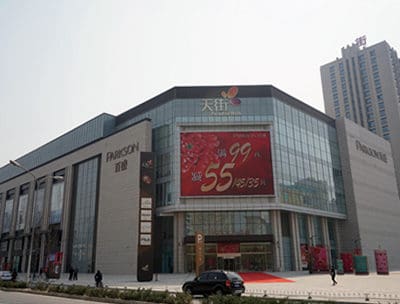
The recently closed Parkson department store in Beijing’s Chaoyang district
Malaysia-based Parkson was a pioneer foreign investor in China’s retail scene, opening its first mainland department store in 1994. Now that location, on Beijing’s Fuxingmen Rd, is the brand’s last remaining outlet in China’s capital as Parkson shutters department stores across the country in the face of slumping sales.
At the end of May, Parkson closed its Longhu Beijing Changying Street department store at the same time that it shut down similar outlets in the cities of Hefei and Zhengzhou, according to a local news agency. The brand now has 46 department stores across China, down from 60 in 2015, as the dated format falters under pressure from trendier shopping malls and surging e-commerce sales.
Department Store Sales Are Still Sinking
Parkson’s total sales in China have been dropping steadily since 2013, declining 8.3 percent year-on-year in 2016 to RMB 14.3 billion, according to the latest annual report of the brand’s Hong Kong-listed business. The gloomy figures track an industry-wide trend. A survey of 85 department store operators found that 55.3 percent saw a decline in sales in 2016, with 15 companies experiencing a more than 10 percent drop.
Department store chains are adapting by closing down loss-making locations. Parkson joins a roster of domestic chains, from Hualian Department Store to Jiuguang Department Store, that have recently shuttered stores. In 2016 alone, Parkson shed five mainland department stores, including one property in Beijing, Sun Palace Parkson, that it sold for RMB 2.3 billion.
Upgrading and repositioning has also emerged as a strategy to turn around obsolete stores. Last month, Shanghai officials closed the iconic No. 1 Department Store and Orient Shopping Center for a major renovation to meet the demands of modern shoppers.
To stay relevant, Parkson, one of the largest department store operators in Asia, is also branching out into more modern retail formats. Parkson’s parent company, Malaysia’s Lion Group, opened its first full-fledged shopping center in China last year. The 230,000 square metre Qingdao Lion Mall offers food and beverage, entertainment and grocery shopping along with traditional retail fare.
Parkson also launched a standalone gourmet grocery store, Parkson Supermarket, and a flagship bakery store, Hogan Bakery, in Shanghai last year. The company has even made a belated foray into the mobile e-commerce world by rolling out a shopping app. It’s unclear how successful these moves will be at reviving Parkson’s flagging fortunes, but the company’s sales did pick up slightly by 1.4 percent in the fourth quarter of 2016, bucking the year’s downward trend.
International Operators Are Staying Away
Parkson isn’t the only international department store operator that has faltered in China. Britain’s Marks & Spencer this year has shuttered all ten of its mainland stores in the face of continuing losses, which the company attributed to low brand awareness and a struggle to grow its market share.
House of Fraser, a department store chain of British vintage owned by China’s Sanpower Group, opened its first mainland location last December in Nanjing after a considerable delay. Sanpower’s founder had spoken of opening up to 50 mainland stores when he bought the mid-market brand in 2014.
Leave a Reply